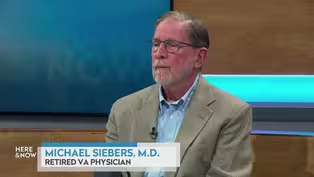Here and Now
Bill Hanna on Impacts of Cutting Federal Social Safety Nets
Clip: Season 2300 Episode 2346 | 6m 6sVideo has Closed Captions
Bill Hanna on what changes to Medicaid and SNAP requirements would mean for Wisconsinites.
Wisconsin Department of Health Services Medicaid Director Bill Hanna explains what proposed changes in requirements for the federal health care program, the ACA and SNAP would mean for Wisconsinites.
Problems playing video? | Closed Captioning Feedback
Problems playing video? | Closed Captioning Feedback
Here and Now is a local public television program presented by PBS Wisconsin
Here and Now
Bill Hanna on Impacts of Cutting Federal Social Safety Nets
Clip: Season 2300 Episode 2346 | 6m 6sVideo has Closed Captions
Wisconsin Department of Health Services Medicaid Director Bill Hanna explains what proposed changes in requirements for the federal health care program, the ACA and SNAP would mean for Wisconsinites.
Problems playing video? | Closed Captioning Feedback
How to Watch Here and Now
Here and Now is available to stream on pbs.org and the free PBS App, available on iPhone, Apple TV, Android TV, Android smartphones, Amazon Fire TV, Amazon Fire Tablet, Roku, Samsung Smart TV, and Vizio.
Providing Support for PBS.org
Learn Moreabout PBS online sponsorshipinsight, doctor Michael Sieber.
>> It's my pleasure.
Thank you.
>> As we discussed earlier, cuts and changes to social safety net programs figure prominently in political discourse right now in Wisconsin.
By the numbers nearly 1.3 million children and adults are enrolled in Medicaid, and 700,000 receive food share.
For a closer look at how congressional changes to these programs could look in Wisconsin, we turn to Bill Hanna Medicaid, director at the Wisconsin Department of Health Services.
And thanks for being here.
>> Thank you.
Happy to be here.
House did on Medicaid and nutritional assistance.
Cuts could go deeper under the Senate provisions.
As it stands before Senate action, some analyzes show nearly 230,000 people in Wisconsin could lose Affordable Care Act.
And Medicaid coverage.
Is that what your analysis is showing?
>> We're focused our analysis on Medicaid.
That's where we have the specific data.
Wisconsin's part of the National ACA plan.
And really we rely on national experts on the ACA data.
But for Medicaid specifically, we estimate that 63,000 adults without children under the age of 18 would be at risk of losing their Medicaid coverage.
I think it's important to note that the coverage won't just impact those individuals.
It really impacts all of us because those individuals will still need to see their doctors or go to the hospital.
They'll just be uninsured.
And those additional costs get passed on to all healthcare consumers.
>> What is it in the bill that prompts people to lose that coverage?
>> Yeah, the House bill creates a lot of additional red tape for this population to maintain their eligibility.
First, it requires them to complete their Medicaid application or renewals every six months instead of once a year, as it is today.
And it requires them to submit documentation to prove that they are meeting work requirements.
>> So what costs to provisions of the bill add for the state of Wisconsin now fashioning its own budget?
>> Yeah, we take eligibility enrollment very seriously here in Wisconsin.
We run a very efficient program.
We have one of the lowest eligibility error rates in the in the country.
But this will require additional costs.
We are really doubling the amount of work in a year to do eligibility for the 195,000 adults that this would subject to, meaning the state and county eligibility workers will need to hire more workers, and we will need to make changes to our system in order to verify and collect that work requirement information.
We estimate it will cost us about five and a half million dollars each year to implement these changes.
In Wisconsin.
>> On Foodshare, the House bill would mean about 90,000 people would lose that assistance.
According to your office.
How does the bill result in those people losing those benefits?
>> Yeah, they're already work requirements in Foodshare today, but the bill drastically changes.
Who is required to meet the food requirements.
Today?
It's adults between 18 and 54 who do not have dependent children.
What the bill does is expands that to adults between 18 and 65 and includes adults with children if their children are not under age seven.
So you've really increased the number of adults that need to meet work requirements in order to maintain their food share benefits.
And we estimate that about 90,000 individuals would likely lose their foodshare benefits because of this expanded requirement.
>> So the bill would also start penalizing the state for snap error rates, costing Wisconsin $207 million annually.
What are those errors?
>> Yeah, errors are just that.
They're errors, right?
It's not fraud.
Determining Medicare or Food share eligibility.
It's complex.
And occasionally there are mistakes.
If you think about doing your taxes and occasionally there is a mistake, there's a lot that changes in people's lives.
Think about this population.
They're often doing gig work, meaning their income can change.
There's a lot of deductions that go into calculating it, so it's complex in getting it to the dollar.
Accurate.
We already have one of the lowest error rates in the country.
In fact error rate went down last year were well below the national average.
The national average is 11.7.
Wisconsin is at 4.4.
But the bill continues to sort of narrow that tolerance for any even $1 error in calculating payments.
It also is an incredible cost shift, not just for the error rate, because what it does for the first time is requires states to contribute towards food share benefits, which at a minimum will cost us $69 million a year in Wisconsin.
It also changes the amount of the administrative costs that the federal government will pay.
Today.
They pay 50% of those costs, split 5050 with the state going forward, they would only cover 25% of the cost.
So that's an additional $51 million for us to just run the program that we run today.
That is a well run program, and the bill gives us no additional tools to control costs or any other flexibilities to try to.
Really control costs in the in the food share program.
>> Well, we appreciate your information.
Bill Hanna.
Both Wisconsin US Senators Oppose Trump Federal Budget Bill
Video has Closed Captions
Clip: S2300 Ep2346 | 1m 15s | Ron Johnson and Tammy Baldwin oppose Trump's budget as it adds to the federal deficit. (1m 15s)
Dr. Michael Siebers on VA Cuts and Health Care For Veterans
Video has Closed Captions
Clip: S2300 Ep2346 | 6m 51s | Michael Siebers on how cuts to VA funding and plans to reduce staff affect patients. (6m 51s)
Here & Now opening for May 30, 2025
Video has Closed Captions
Clip: S2300 Ep2346 | 1m | The introduction to the May 30, 2025 episode of Here & Now. (1m)
Meriter Nurses Strike For Better Working Conditions and Pay
Video has Closed Captions
Clip: S2300 Ep2346 | 1m 10s | Hundreds of nurses at Meriter Hospital in Madison went on strike with multiple demands. (1m 10s)
Rep. Dean Kaufert Hopes For Consensus in Wisconsin Politics
Video has Closed Captions
Clip: S2300 Ep2346 | 6m 44s | Dean Kaufert on money and hostility in politics as he seeks to build bipartisanship. (6m 44s)
Wisconsin's Health Care Workforce Conditions Rebound in 2025
Video has Closed Captions
Clip: S2300 Ep2346 | 3m 5s | A 2025 report about Wisconsin's health care workforce found gains in some professions. (3m 5s)
Providing Support for PBS.org
Learn Moreabout PBS online sponsorship
- News and Public Affairs

Top journalists deliver compelling original analysis of the hour's headlines.

- News and Public Affairs

FRONTLINE is investigative journalism that questions, explains and changes our world.












Support for PBS provided by:
Here and Now is a local public television program presented by PBS Wisconsin





